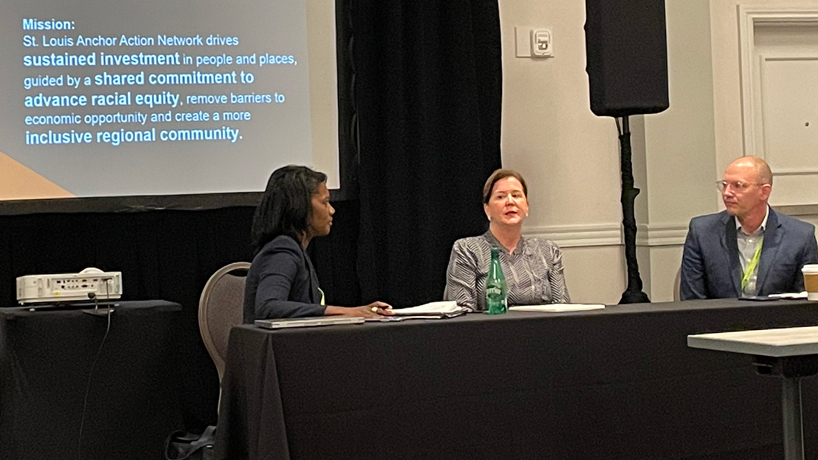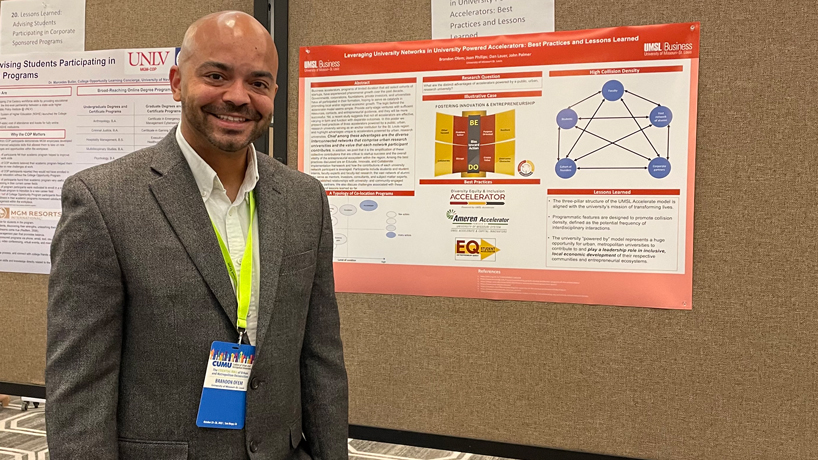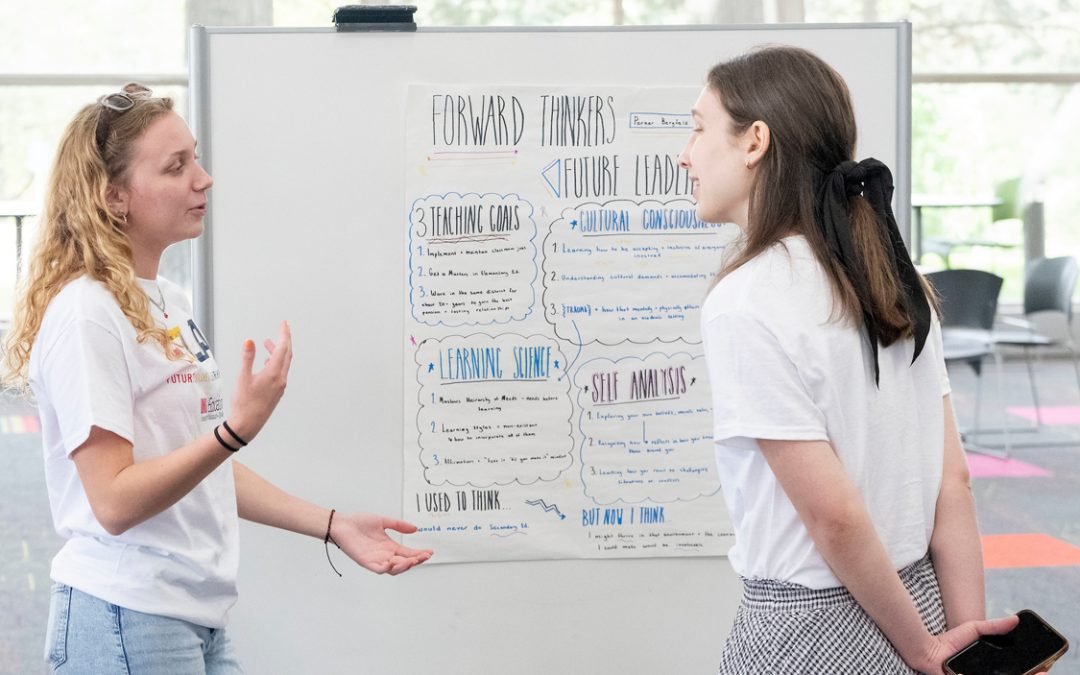
St. Louis Anchor Action Network Director Stefani Weeden-Smith (at left) takes part in a panel discussion about the network with Edward Jones principal Laura Ellenhorn (center) and Karl Guenther, UMSL’s assistant vice chancellor for economic and community development, at the Coalition of Urban and Metropolitan Universities’ annual conference last week in San Diego.
The University of Missouri–St. Louis serves a critical role in the St. Louis region as its only public, research university, providing educational opportunities to a diverse group of students and helping train the workforce that drives its economic fortunes.
UMSL faculty and staff members are also committed to fulfilling the university’s anchor mission by using their knowledge and expertise to help identify and address some of the region’s biggest challenges, including issues of equitable growth, educational access, and workforce development. They have many lessons to share that can benefit similar institutions around the country.
It was fitting, then, that UMSL faculty and staff members led five presentations earlier this week at the Coalition of Urban and Metropolitan Universities annual conference, which was held Oct. 23 through Oct. 26 in San Diego.
“The University of Missouri–St. Louis is one of the leading metropolitan universities in the country, and we hope to serve as a model for others to emulate,” said Chancellor Kristin Sobolik, who attended the conference and serves on CUMU’s 14-member executive committee. “I was so pleased that so many of our talented faculty and staff members could attend this week’s conference and share the tremendous work they do on behalf of UMSL and our region.”
Here is a look at the UMSL-led sessions:
Promoting College Matriculation & Student Success Through Strategic College Access Programming
Sobolik joined Natissia Small, UMSL’s vice provost for access, academic support and workforce integration, in leading a mini-workshop that highlighted UMSL’s Bridge Program, long recognized for using a multi-tiered approach to providing free, comprehensive precollegiate student support to area high school and junior high school students of diverse socioeconomic backgrounds. Graduates of the Bridge Program’s Saturday Academy have a 100% college matriculation rate since 2003. The workshop was a chance to discuss challenges and outcomes and share lessons learned so that others might adopt Bridge’s model at their institutions.
Leveraging Networks in University Powered Accelerators: Best Practices and Lessons Learned
Assistant Professor Brandon Ofem gave a poster presentation on UMSL’s university-led accelerators at last week’s Coalition of Urban and Metropolitan Universities conference in San Diego.
Brandon Ofem, an associate professor in the Department of Global Leadership and Management; Dan Lauer, the founding executive director of UMSL Accelerate; and Joan Phillips, a professor of marketing, gave a poster presentation in which they shared best practices for building business accelerators, including the Anchor Accelerator, which is currently identifying participants for its third cohort. They highlighted UMSL Accelerate’s “Educate, Innovate, and Collaborate” implementation framework and how the contributions of each university network participant is leveraged with students and student interns; faculty experts and faculty-led research; and the vast network of alumni who serve as mentors, investors, consultants and subject matter experts. They also noted the role of established relationships with university- and community-engaged corporate partners and shared challenges and lessons learned.
Corporations and Anchor Collaboratives: Exploring Their Why and How
St. Louis Anchor Action Network Director Stefani Weeden-Smith joined Karl Guenther, assistant vice chancellor for economic and community development, and Laura Ellenhorn, a principal and the head of community impact at Edward Jones, to lead a panel discussion about the network – a unique partnership among higher education, healthcare systems, and corporate partners – committed to increasing employment and income within a focused geography that has many assets and strong communities but has faced substantial systemic disinvestment over many years. UMSL and Edward Jones are co-leading the network. The panel highlighted how the addition of corporations, such as Edward Jones, Equifax and Ameren, has enhanced the multi-pronged approach of the network and the scale that will be needed to tackle the long history of concentrated disinvestment in St. Louis. Weeden-Smith, Guenther and Ellenhorn discussed how organizations have embraced the anchor mission and how involvement in the network has fostered a new way to approach equitable economic development and community engagement, prompting internal changes and new partnerships.
Building Partnerships to Train the Nursing Workforce to Work with Underserved Inner-city Communities
College of Nursing Dean Roxanne Vandermause and Assistant Professor Sheila Grigsby led a roundtable showcasing the strong collaborations and partnerships UMSL has with representative community agencies and why they are essential to ensuring students receive tailored, experimental learning opportunities that provide a diverse, comprehensive training so they’re prepared to best serve all patient populations. Under the Community Engagement/Service-Learning program, developed last fall, UMSL has established relationships with community-based agencies, federally qualified health centers and organizations focused on health, many of them located in often underserved urban areas. UMSL’s agreements with its partners are structured so that students are placed inside the organizations for three consecutive semesters to learn about the organization and are prepared to lead projects at graduation. These partnerships not only benefit the students but also provide needed support to community organizations that are often understaffed as they work to fill the needs of traditionally underserved communities.
Mapping the Way to Innovative, Equitable and Effective Policy
Emily Blackburn, who serves as a geospatial analyst in UMSL’s Geospatial Collaborative, led a roundtable highlighting how UMSL is working to help develop the future geospatial workforce in St. Louis and ensure that it reflects the diversity of the region. The university is working both internally and externally to develop K-16 educators proficient in GIS, begin to train the next generation of geospatial professionals through outreach and curriculum modification and create research projects in diverse fields of study, which illustrate the ubiquity of geospatial techniques and their impact. Last year, UMSL signed an Educational Partnership Agreement and a Collaborative Research and Development Agreement with the National Geospatial-Intelligence Agency, the latter of which allows for UMSL researchers to collaborate on NGA geospatial research, training and other innovation initiatives. The Geospatial Collaborative is also collaborating on a diverse array of research projects to analyze local, regional, and national issues using maps and geospatial tools to show systematic issues facing the region and using key partnerships to develop better approaches to address those long-standing problems.















